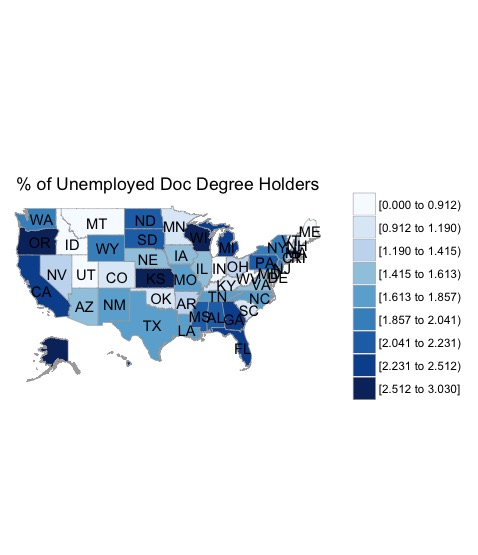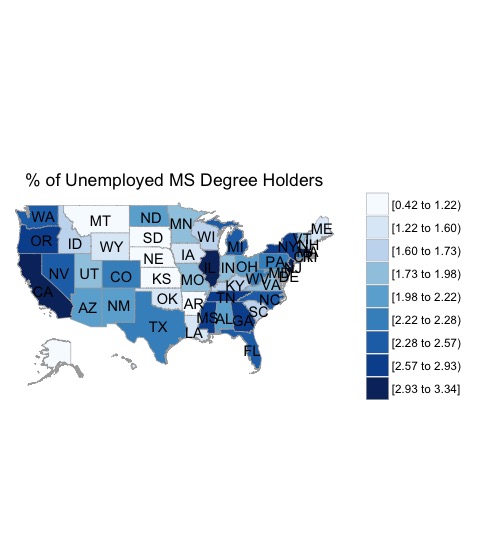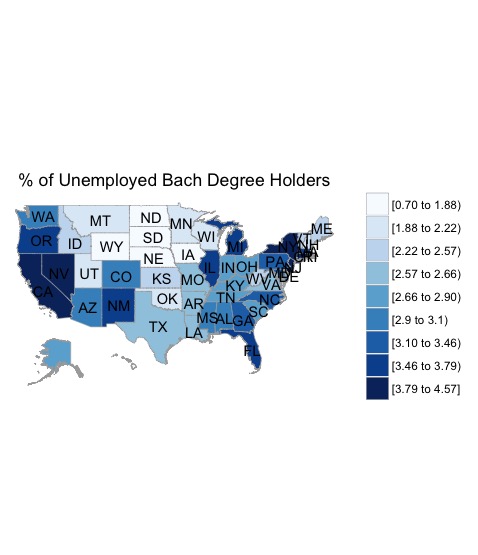Like the header of my blog says, I am back at it again with the data analysis! (Click here for my last blog installment). For this installment I thought it would be interesting to use the 2013 American Community Survey (ACS) data for some career-planning answers. If you are not familiar with ACS, it is basically an ongoing statistical survey conducted by the U.S. Census Bureau that can be found on www.census.gov. Now, as mentioned in my About me, I recently graduated Boston College last Spring (2015) and I am currently pursing my Masters in Informatics at Northeastern. While I think I made a wise decision in pursuing a Masters, I thought it would be cool to see if I can prove that to any naysayers. Also in the process I wanted to see if a PhD is worth pursuing, just in case anyone is on the fence. As an added bonus, I even pinpointed which states these degrees can help you the most in terms of employment and in which they do not. I was able make all the analysis/plots (yes even the graphs and maps) from start to finish using R. Please scroll to the bottom for an annotated version of the code I used. Enjoy!
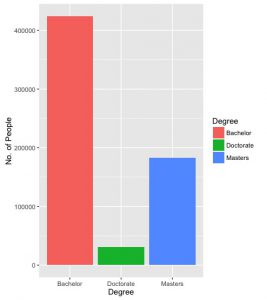
Here is an barplot that show you the number of degree holders around the country.
- It’s easy to see that there are far more bachelor degree holders than the other two combined.
- What this helps me conclude is that pursuing a Masters and then a Doctorate can help distinguish you from the crowd. But is the return on investment actually worth it? Let’s find out!
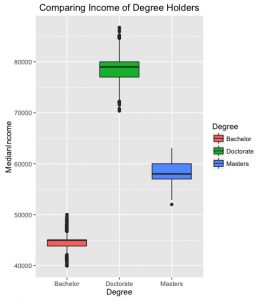
Here is a box plot of the median income for all three degrees.
- As we see here, those with a doctorate have a higher median income than those with a masters and bachelors.
- For this purpose we can conclude that the higher the degree the more likely you will be financially successful.
- But this brings up the question of what percentages of degree holders are unemployed? Certainly we would all find that a degree is worth it if it can guarantee us a more likelihood of being employed! Check this out:
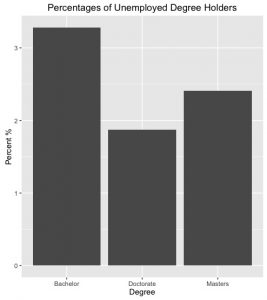
Here is another bar graph that depicts the percentages of unemployed degree holders.
- We can safely conclude that the higher the degree, the higher your odds are of being employed. In other words the higher the degree, the lower the unemployment rate.
- However, it is worth noting that the difference between master’s and doctorate is minimal. Let’s have a look at the unemployment rate of all three degrees by state.
- There are a couple of trends that we can gather from these three graphs. Massachusetts, California and Oregon all appear to be in the darkest shade in all three. We can conclude that these states are the toughest on degree holders.
- Second, Montana and Oklahoma appear in the lightest shade on all three graphs. We can conclude that these two states give all three degree holders the best chance of being employed.
Conclusions: The higher the degree…..
- The higher the degree, the more likely you will have a higher income. More specifically having a masters or a doctorate leads to significantly higher income than to those with a bachelor.
- Although having a higher degree gives you better odds at landing a job, the difference between a masters and a doctorate is minimal. Therefore , the return on investment for a doctorate can be lucrative but it barely increases your chances on employment and ultimately may not be worth it within a poor job market.
- It seems like places like Massachusetts, California and Oregon are the harshest markets for all three degree holders. These three states all appear in the bottom 10 of employment rate for all three degree holders.
- It seems like Montana and Oklahoma are the the best markets for these degree holders. These two states appear in the top 10 of employment rates for all three degree holders.
- Thus, in conclusion, pursuing a Master’s seems worth it and depending on the market and situation, a doctorate is worth it as well. So come on and sing it with me: The higher the degree, the more likely you will be!

